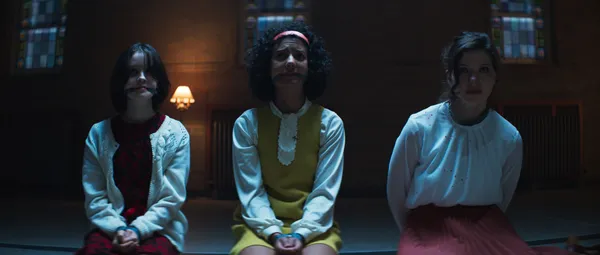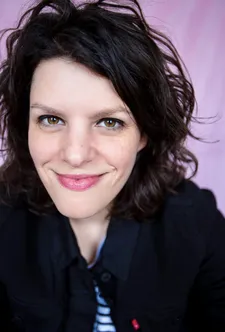 |
| Chloë Levine, Madison Baines and Georgia Acken in The Sacrifice Game Photo: courtesy of Shudder. A Shudder release. |
In a remote boarding school, a young teacher stays behind to look after two lonely girls over Christmas. One a nearby road, four Satanically-inspired members of a violent gang are driving in search of a prophesised destiny. When these two worlds collide, horror ensues – but not quite in the way you might expect. The Sacrifice Game is the latest work from Jenn Wexler, and it’s one of this year’s most eagerly anticipated genre releases, coming to Shudder this Friday.
 |
| Jenn Wexler, director of The Sacrifice Game Photo: courtesy of Abi Lieff. A Shudder release. |
The film has been a big hit on the festival circuit. It débuted at Fantasia, and it was there that I spoke with director Jenn Wexler, who is one of the biggest personalities in horror cinema and always bursting with energy. She was particularly enthused about this film, and I asked her how its seemingly disparate pieces came together.
“There was a draft I wrote in 2013, and I realised it was a little too big for my first feature, so I changed course,” she explains. “I started working on The Ranger, which was smaller and felt easier to achieve. And then after The Ranger came out and I had produced, by then, several movies, I was ready to take this on.
“Like any first draft, it was a full script, but all the pieces didn't quite fit together. There wasn't as much character. There wasn't enough character development. All those things. There was a concept. There was a couple key scenes I was obsessed with. And when Sean and I started working on it, I was like, we're not changing this scene. And I'll say specifically, it's the dinner scene in the middle of the movie, the big dinner scene with the mashed potatoes.
“That scene, I think, is pretty much line for line, exactly what was in the original script. But in working with Sean – we worked together all the time, bouncing ideas off of each other, but this was our first official collaboration as screenwriters. And I'll also say Sean is now my husband. And at the time we wrote this, he suggested something. He does these mic drop things where he'll walk in the room, say a line that's like a mic drop, and then he'll walk out of the room, and I'll be like, ‘Oh, my God, you just broke open this story. What the hell?’ And he does it super casually, and it's always very magical to behold. He did it on the Ranger, too.”
She explains that when she was writing the script for that film, he walked into the room, told her the twist revealed close to the end, and then left.
“I was like, ‘Oh, my God. That's the whole backstory! Okay. Amazing.’ And so for this, he did that as well. For the plot. So it was a similar concept, except he also wrote a bunch of scenes. He wrote a lot of dialogue, especially for some of the male gang characters. We passed the script back and forth with each other so much that now we have little arguments. He'll be like, ‘I wrote that,’. And I’ll be like, ‘No, I wrote that. What are you talking about?’ It's almost gotten to the point where our minds have merged and we forget who did what.”
 |
| Chloë Levine in The Sacrifice Game Photo: courtesy of Shudder. A Shudder release. |
I tell her that I like that dinner party scene a lot because a lot of the build up, particularly at that stage in the film, is really about bullying rather than anything specifically Satanic. It’s another layer of horror within the film.
“Yeah, absolutely,” she says. “I just wanted to explore my favorite horror subgenres with this movie. I wanted to do that with The Ranger too. This does it in different ways with different subgenres. I wanted to merge the home invasion and the demonic and bring all these influences together in different ways while also telling a story of being a teen girl and not having friends and finding them, and those kinds of things.”
Being set in 1971 as well, it's very close to the Manson family murders, and the way that the gang is depicted comes across a lot like it's part of that tradition. Was that intentional?
“Yeah, well, I read Helter Skelter when I was a teenager, and so it's always been with me. I've always been very fascinated by the Manson murders, and I listened, just for fun, to the You Must Remember This podcast about the Manson family. So that was definitely in my mind. I wanted to play with that while also bringing a different dimension to it, where it’s also influenced by Scooby-Doo. My entry point into horror was Buffy The Vampire Slayer. That, I think, will always stay with me because I was twelve when I was obsessed with that show and I think that's just now part of my personality. So it was just kind of taking all these influences and then filtering them, that kind of thing.”
 |
| Madison Baines in The Sacrifice Game Photo: courtesy of Shudder. A Shudder release. |
There are also references to the war in Vietnam there as well. There's a little snippet on the TV at one point which looked to me like part of the Winter Soldier investigation that would have been hitting TV around then. Was that also something that she wanted to comment on with the film?
“Absolutely, 100%. Because we're playing with the idea of sacrifice on many levels. I mean, we're playing with the horror movie tropes of sacrifice, but then we're also talking about societal sacrifice, and, as individuals, what are we willing to sacrifice to get what we really want? And also systemically, what does society want us to sacrifice, sometimes in ways that we don't even realise that we're doing, for darker reasons? And who's really pulling the strings? And just the way that our politicians talk to us, and things going on right now in society, with people following politicians who are willing to risk other serious things in terms of their talking points.
“We found similarities and resonances in the early Seventies at this time when soldiers were being sent to Vietnam and were invading another country and there was all this awful murder and bloodshed. I was actually looking for different footage for the television. It was a process, finding the right kind of footage, because I still wanted to maintain the fun, dreamlike, fairy tale quality of the movie, and there was so much awful footage from that time. It was kind of a balance. I wanted to show the soldiers as a unit just invading, but not be too explicit at the same time.”
It's difficult these days to present an occult ritual in an exciting way because people have seen so many of them. Here it's just little tiny things we see, or at one point a whisper that we hear, that carry a lot of the horror and make the film work.
 |
| Olivia Scott Welch in The Sacrifice Game Photo: courtesy of Shudder. A Shudder release. |
“Yeah. A theme of the film, and I think a theme of just the way I think about the world and life, is that we don't know what's going on with God or the universe. We just don't know. But there's so many people that think that they know, and there's so many people that live their lives like they know what God wants, and that hurt other people in the name of God. Not to get too deep into it, but just to say, like, I don't know. We know what we know, and we don't know everything. So to actively be harmful to other people and to their rights and to their lives and their ability to live their most free life, in the name of this thing and these stories...” she shudders.
“Since I became aware of it all when I was a kid, I've always felt uncomfortable with that. So I did want to make a movie about these characters who think that they know. They're like, ‘This is the plan. We're being spoken to. These are the clues. These are the signs. Yes, it's a sign!’ And they think they know, but they're actually harming other people and creating harm for themselves. And then actually, they have no idea what they're doing. They have no clue whatever. They don't see the bigger picture. So bringing those personal feelings and those personal views and then playing with the horror movie tropes, was fun and fascinating for me.”





















